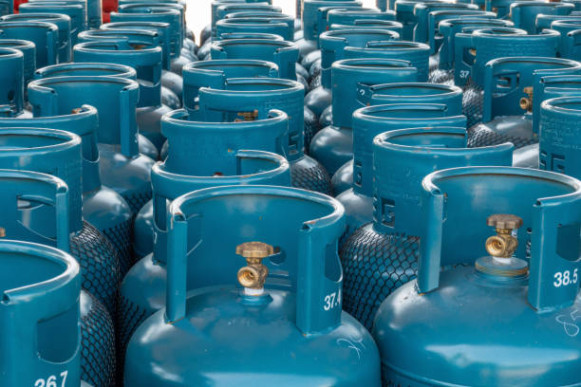- 8063
- 1
Sharing Ideas and Updates on LPG in Nigeria and related information to enable effective collaboration within the LPG Value Chain
The Complete Guide To Starting A Profitable Liquefied Petroleum Gas (LPG) Supply Business In Nigeria.

LPG, also known as propane or butane, stands at the forefront of clean and efficient fuel options in Nigeria and across Africa. This versatile energy source finds use in cooking, heating, and transportation, offering a cleaner alternative to conventional fuels like wood, charcoal, and kerosene, which can be detrimental to both human health and the environment.
According to the Nigerian National Bureau of Statistics, the consumption of LPG in Nigeria has exhibited steady growth, with a remarkable 43% increase recorded between 2015 and 2019. The Nigerian government has been actively encouraging the use of LPG as part of its efforts to reduce greenhouse gas emissions and promote sustainable energy. Globally, the LPG market is expected to grow at a compound annual growth rate of 4.7% from 2020 to 2025, according to a report by Mordor Intelligence.
Despite the surging demand for LPG, the supply chain in Nigeria and Africa grapples with issues such as inadequate infrastructure, low consumer awareness, and limited access to financing. Nevertheless, this scenario unveils opportunities for forward-thinking entrepreneurs to invest in the LPG supply business, recognizing the industry's potential to foster job creation and drive economic development.
Moreover, Nigeria holds the potential to become a major LPG exporter. The nation boasts abundant reserves of natural gas, the primary raw material for LPG production. According to the Nigerian National Petroleum Corporation Limited, Nigeria has the capacity to produce up to 5 million metric tons of LPG annually, with the possibility of exporting to neighboring African countries.
The Liquefied Petroleum Gas (LPG) supply business encompasses the entire process, from production to distribution and sales. LPG, a clean-burning, efficient, and safe fuel, is utilized for various purposes such as cooking, heating, and industrial applications. LPG, scientifically known as a propane-butane mixture, is a by-product of the oil and gas industry, derived through the refining of crude oil and natural gas processing.
Initiating an LPG supply business necessitates comprehensive market research to identify potential customers and their specific LPG requirements. This includes understanding their location, volume needs, and preferred delivery methods. Once market research is complete, production can commence. LPG yield during production varies depending on the source, extraction method, and refining process employed.
Effective distribution of LPG requires meticulous planning to ensure safe transportation, storage, and handling. LPG supply businesses can select from various distribution channels, including cylinder refilling plants, bulk storage facilities, or direct sales to industrial clients.
The demand for LPG in Nigeria and Africa is poised to rise as countries increasingly adopt cleaner energy sources. With ample natural gas reserves in the region, the potential for LPG supply businesses is immense. Nevertheless, challenges, such as regulatory constraints, infrastructure limitations, and safety concerns, must be addressed for these businesses to thrive.
LPG, with its numerous advantages, stands as a preferred choice for consumers and industries alike. It is cost-effective, environmentally friendly, reliable, efficient, versatile, safe, and reduces dependence on fossil fuels. Additionally, it fosters job creation, income generation, rural development, improved health, and reduced environmental impact.
The LPG supply business in Nigeria and Africa offers diverse opportunities for entrepreneurs, including LPG distribution, retailing, cylinder manufacturing, pipeline construction, equipment manufacturing, conversion, export, consultancy, safety training, research and development, storage facilities, marketing and branding, financing, regulatory services, and more.
To navigate the LPG supply business effectively, understanding key facts about the industry is crucial. These include increasing LPG consumption, vast reserves in Nigeria, diverse applications, competitive market, government support, and the potential for export.
While the LPG supply business presents lucrative opportunities, it is not without its challenges. Safety concerns, inadequate infrastructure, limited awareness, government regulations, inadequate funding, high startup costs, limited access to technology, and supply constraints are among the hurdles faced by entrepreneurs in this industry.
Conclusively, the LPG supply business in Nigeria and Africa holds immense promise for entrepreneurs willing to embrace its potential and address its challenges. As the demand for cleaner and more efficient energy sources continues to rise, LPG stands as a beacon of opportunity for economic growth, job creation, and sustainable development in the region.
Note that if you want to start the LPG business, it will do much good to follow the daily pricing and weekly mont belvieu pricing from the LPG in Nigeria page . Also join the newsletter, follow on Facebook , Twitter or LinkedIn
We like to hear from you.
Do you still think being a supplier of LPG in present day Nigeria?
If you are, what are the challenges and benefits your business faces?
















T J
08 September 2023 - 10:31amNice
Reply